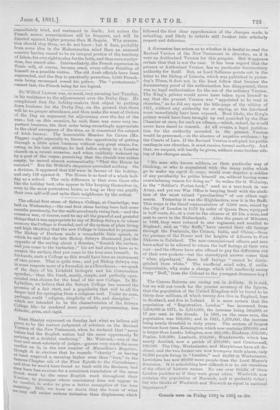"No man who knows soldiers, or their particular way of
thinking, or who is acquainted with the many trifles which go to make up esprit do corps, would ever deprive a soldier of any peculiarity he prides himself on, without having some overwhelming reason for doing so." So writes Sir G. Wolseley, in the " Soldier's Pocket-book," used as a textbook in our Army, and yet our War Office is busying itself with the aboli- tion of the moat valued "peculiarities" of our oldest regi- ments. Yesterday it was the Highlanders, now it is the Buffs. This corps is the lineal representative of 3,000 men, raised by the City of London in 1572 by order of Queen Bess, equipped in buff coats, &c., at a cost to the citizens of 23 10s. a man, and sent to serve in the Netherlands. After the peace of Munster, in 1648, they were reduced to one regiment, and recalled to England ; and, as "the Buffs," have carried their old facings through the Peninsula, the Crimea, India, and China,—from the passage of the Douro and the heights of Albuera to Fort Ekkowe in Zululand. The non-commissioned officers and men have asked to be allowed to retain the buff facings at their own cost—and the officers have also offered to pay the difference out of their own pockets—but the stereotyped answer comes that " when pipeolayed," these, buff facings " cannot be distin- guished, from white." The nuofficial mind asks, if undis- tinguishable, why make a change which will needlessly annoy every " Buff," from the Colonel to the youngest drummer-boy


































 Previous page
Previous page